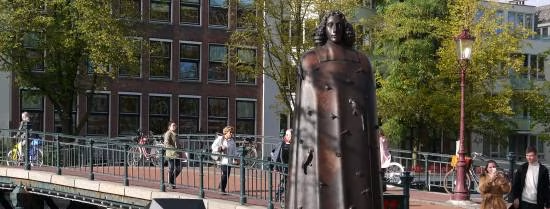Andrea Sangiacomo will be appointed endowed professor as of 1 September and will hold the Spinoza Chair at the Erasmus School of Philosophy. The Spinoza Chair 'The Actuality of Spinoza' is funded by the Erasmus Foundation, G. Ph. Verhagen-Stichting, Vereniging Het Spinozahuis, Stichting Elise Mathilde Fonds, Van Cappellen Stichting and the Erasmus Trust Fund.
Guidance by Spinoza
After experience taught me that all things that frequently happen in common life are vain and futile, … I eventually decided to investigate whether there could be something that was a genuine good … even better, if there was something that, once found and acquired, could provide a constant and supreme joy for all eternity. - Spinoza
“This is the opening of Spinoza’s early Treatise on the emendation of the intellect. Spinoza’s philosophy is aimed at seeking an alternative form of happiness: reliable, lasting, sharable with others, and sustainable. Did he find it? What can we learn from his quest? Today more than ever, we need to rethink how we conceive and pursue happiness, not only for the sake of enjoying greater wellbeing, but also in view of the impact that our individual and collective actions bear on the whole ecosystem. We need more sustainable ideals of happiness than those we’ve been following so far. Spinoza can help us. Exploring how is the main purpose for my taking up this appointment in Rotterdam.”
About the Spinoza Chair
The world seems to be adrift and major issues today are inciting reflection. Fundamental philosophical concepts such as truth (think of the post-truth debate), reasonableness, tolerance, and cosmopolitanism (in a global culture of increasing polarization) all play a crucial role in this respect. How do we survive in a world defined by great divides? How do we face the ecological crisis? How do we deal with the pressures to democracy? These are topics that have been around for centuries and that have been considered by numerous thinkers. One of the most important examples of this has been the Enlightenment thinker Baruch Spinoza (1632-1677). His thinking on, for example, the secular state and truth claims is extremely relevant today, while conversely engaging with these debates can renew and deepen our understanding of Spinoza.
The chair is made possible by the Erasmus Foundation, G. Ph. Verhagen-Stichting, Vereniging Het Spinozahuis, Stichting Elise Mathilde Fonds, Van Cappellen Stichting and the Erasmus Trustfonds, among others.
- CV
Andrea Sangiacomo is, besides appointed endowed professor at Erasmus School of Philosophy, an associate professor of philosophy at the University of Groningen, where he is currently running an ERC-Starting Grant on the ‘Normalization of natural philosophy: how teaching practices shaped the evolution of early modern science.’ He is also co-editor in chief of the newly established open access Journal of Spinoza Studies. He has worked and published extensively on Spinoza (his most recent monograph is Spinoza on Reason, Passions, and the Supreme Good, Oxford University Press, 2019) and early modern philosophy and science. For some years, he has been interested in cross-cultural dialogues between Western and Eastern traditions (especially ancient Buddhism).
- More information
Erasmus University Rotterdam acknowledges the importance of Spinozism for today's society by establishing a renewed endowed chair. Andrea Sangiacomo will focus on the actualization of Spinoza's thought.

